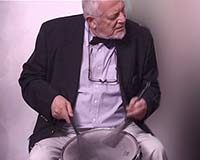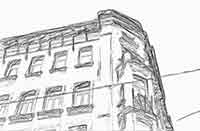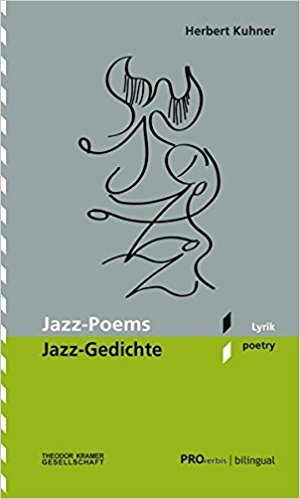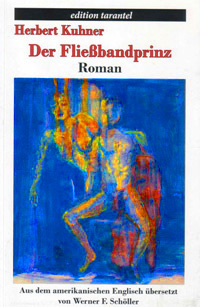-A Good Start
ELOQUENT COMMENTS: A GOOD START BUT NO FOLLOW-UP
 Here are reviews by Edward Butscher and Aaron Kramer and a comment by Harry James Cargas of Borders/Grenzen by Peter Paul Wiplinger., my first book of poetry in translation. Regretfully there was no-follow-up.
Here are reviews by Edward Butscher and Aaron Kramer and a comment by Harry James Cargas of Borders/Grenzen by Peter Paul Wiplinger., my first book of poetry in translation. Regretfully there was no-follow-up.
Edward Butscher
POETS Magazine, New York
PETER PAUL WIPLINGER: BORDERS/GRENZEN. TRANSLATED BY HERBERT KUHNER. Cross Cultural Communications, Merrick, New York. 72 pages.
Paperback $4.50, ,Hardcover‘ $8.50
Our century celebrates noise, spreads information, breeds a void. Where language begins and ends is difficult to grasp, since silence is impossible without its existence, its echo. For the poet, this means a greater concentration on print and space, the extreme, unnatural relation-ship between the two. One result has been an increasing tendency towards elliptical brevities, as in the work of Orr, Simic, Tate, et.al. Behind it, of course, looms the assumption that the intensity of the material being handled demands the distancing of understatement and surrealistic strategies.
Peter Paul Wiplinger, the Austrian poet, is aware of both the silence and its menace, as the title of this collection makes clear, and his own poems are often starker than knife slashes on the page, each word rippling, at times, with a violent anguish barely held in check‘ „time/ is reality/ a stone/ carries the message.“
Lack of punctuation accentuates the scene’s bleakness a „Cemetery in Achlat“– and weds missing connections. More important, topography and poetry share the same bed, as the message on every tombstone „binds/ words/ to the sky/ to the earth.“ Adjectives and adverbs have been jettisoned during the marriage, as if qualifications of any kind suggested infidelities, wet dreams of transcendence.
In another poem, „Thirty Years Later“, the separation of words from silence has been lessened to the point where language mounts itself:
you can’t remember their names
what they were called
in Lidice and Novosibirsk
and their shrouds
bang like white flags
in the garden
you ascend in an elevator
you can’t remember
but you suddenly realize
that you’ve lost everything
and you’re standing in a corner
saying I love you
you ascend in the elevator
knowing what will happen
thinking of the white shrouds
but you can’t remember their names
Ostensibly a lament for survivor and victims, the poem cannot escape its. concern for itself as poem, the metaphor of shrouds like flags
of surrender implying the cognitive act of naming, naming in black against white space; the threat, constant, of nothingness is restrained by language alone—even memory has failed. Other strong Poems, i. e. „Relics,“ „Butterfly‘,'“ „We Do Not Die Out,“ and „Cornelia,“ confront a similar duality of purpose, art and life intermingled with an unrelieved emphasis on fierce oppositions, on the poles of human experiences „signs of love/ signs of death/ earth and snow/ sun and stone.“
Though born in 19394 Wiplinger remains obsessed with the enormous reality of the concentration camps, despite his patent refusal to accept that „Auschwitz/has made writing poetry/ impossible.“ His borders, his thin black lines of lyric, are heavy with the loss of meaning his generation has inherited. Like the generation of poets who lost their faith in civilization after the slaughters of World War I, he must depend upon fragments to shore up his ruins, as in „Relics „:
sentences
deserted houses
broken bridges
days like sunken ships
the throbbing of blood
fingerprints
your photo
and my breath
in bed
next to you
The existential despair here clings to the tokens of language and things, refusing rhetoric in the process. And yet, such a minimalist aesthetic carries its own dangers, a potential ‑ for false significance and precious self-indulgence that Wiplinger does not always avoid. Too many of his poems remind us that pain is not enough, that literature requires more. In „On the Threshold of Death“, for instance, simple idea and simple words produce little beyond a simplistic sentimentality:
on the threshold
of death awaking
to joy
on the threshold
of death awaking
to love
on the threshold
of death awaking
to yourself
finding the way in death
to joy
to love
„Extinguish the Signs,“ „For Myself,“ „Drawing Back,“ and „You and I“ are other poems suffering from the same malaise of abundant reality
and in-sufficient art—Eliot’s „objective correlative“ is missing.
But perhaps the risks are worth it. Enough of Wiplinger’s taut lyrics triumph over their sparse diets to make‘ the collection a valuable one for us and a fundamental one for their author. The final sequence, „Black Poppies“, intimates that a tropic break-through is perhaps imminent, though it will rise from its own ashes „the inventory/ was accurate/ this was made apparent/in the morning/ by the dead birds/ and the bleeding sun.“
*****
vector magazine/arts & entertainment
179 main street, hackensack, new jersey 07601/201-487-0383/0384
PETER PAUL WIPLINGER: BORDERS/GRENZEN.
TRANSLATED BY HERBERT KUHNER
Cross-Cultural Communications, Merrick,
New York. 72 pages. Paperback $4.50,
Hardcover; $8.50
Borders is both harrowing and thrilling; it strikes the reader dumb. „Auschwitz/has made writing poetry/ impossible/said Theodor Adorno Wiesengrund/and he should have known/since he survived.“ lt was a holy and excruciating task Wiplinger undertook: to utter the words neither Auschwitz ghosts nor its surviving poets could utter, humbly offering himself ‚as the lips of a tremendous theme. And what music rises from his page: Always low-keyed, always stark, it pierces and overwhelms and illumines with its vision of humanity agonized but undestroyed: „We’re no longer here/ but something is still here/besides us in which we are.“
Aaron Kramer (13 December 1921 – 7 April 1997)
*****
Harry James Cargas (June 18, 1932 – August 18, 1998) was an American scholar, author, and teacher best known for his writing and research on the Holocaust….Dr. Cargas was honored for his work on the Holocaust, human rights, and teaching excellence. “In Borders Wiplinger gives us magnificent poetry and it is magnificently translated by Herbert Kuhner…. Spare, powerful, extremely moving, Wiplinger’s short poems, each contains a lifetime of seeing and understanding.”










 Users Today : 120
Users Today : 120 Users Yesterday : 107
Users Yesterday : 107 This Month : 516
This Month : 516 This Year : 7893
This Year : 7893 Total Users : 229029
Total Users : 229029 Views Today : 330
Views Today : 330 Total views : 1964843
Total views : 1964843 Who's Online : 2
Who's Online : 2




